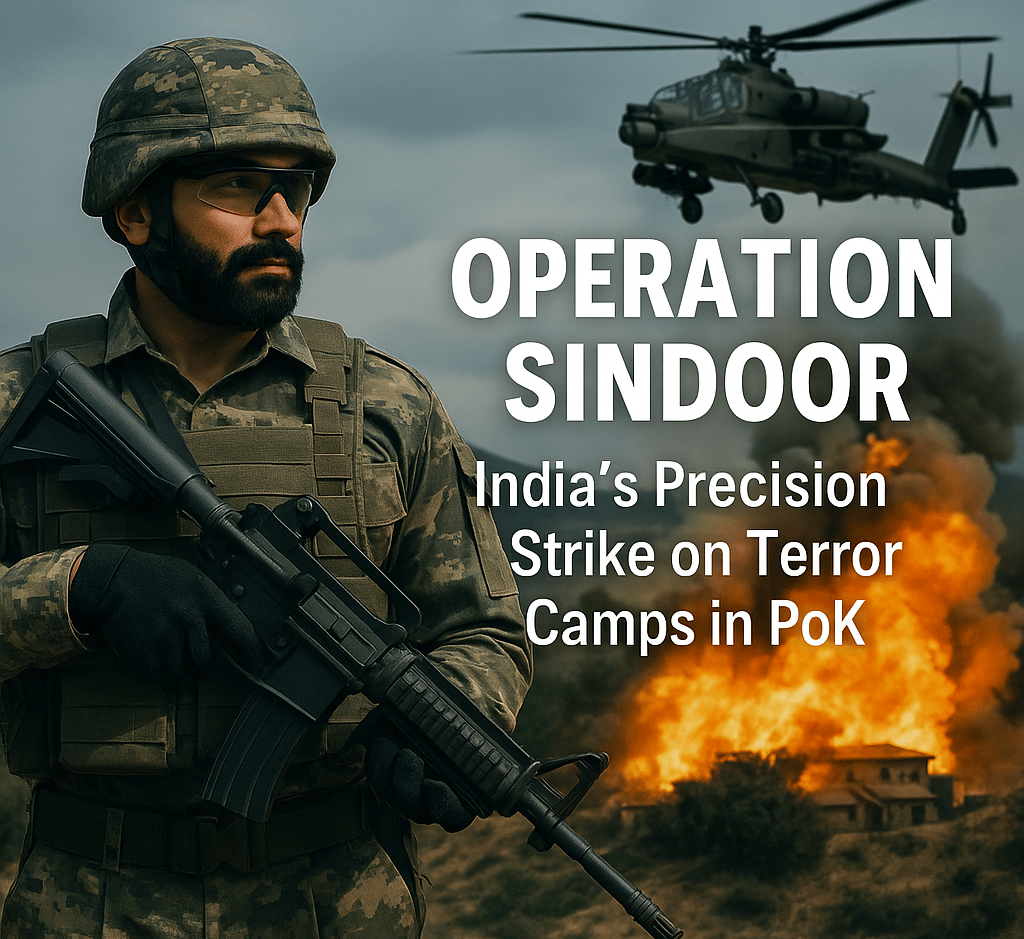Operation Sindoor: India’s Precision Strike on Terror Camps in PoK
SD
5/6/20252 min read


Operation Sindoor: India’s Strategic Response to the Pahalgam Terror Attack
In the early hours of May 7, 2025, the Indian Armed Forces launched Operation Sindoor, a precision military operation targeting terrorist infrastructure in Pakistan and Pakistan-occupied Jammu and Kashmir (PoJK). This decisive action was a direct response to the Pahalgam terror attack on April 22, which resulted in the tragic loss of 26 civilians, including 25 Indian nationals and one Nepali citizen. The operation underscores India’s commitment to combating terrorism and ensuring national security.
Background: The Pahalgam Terror Attack
On April 22, 2025, terrorists opened fire in the Baisaran valley of Pahalgam, a popular tourist destination in Jammu and Kashmir. The attack claimed 26 lives, marking one of the deadliest incidents in the region since the Pulwama attack in 2019. Investigations pointed towards terrorist groups operating from across the border, prompting the Indian government to vow a strong and measured response.
Execution of Operation Sindoor
Operation Sindoor was meticulously planned to target specific terrorist infrastructures without escalating into a broader military conflict. Key aspects of the operation include:
Targets: Nine sites identified as terrorist hubs were struck. These included locations in Muzaffarabad, Kotli, Bahawalpur, and Muridke, areas known for harboring groups like Lashkar-e-Taiba and Jaish-e-Mohammed.
Methodology: The strikes were conducted using precision-guided munitions, ensuring minimal collateral damage. Importantly, no Pakistani military installations were targeted, emphasizing India’s intent to avoid unnecessary escalation.
Timing: The operation commenced around 1:44 AM IST, capitalizing on the element of surprise and minimizing civilian presence in the targeted areas.
The Indian Army’s official statement highlighted the operation’s focused and non-escalatory nature, stating, “Our actions have been focused, measured, and non-escalatory in nature. No Pakistani military facilities have been targeted.”
Immediate Aftermath and Reactions
India’s Stance
Following the operation, the Indian Army declared, “Justice is served. Jai Hind!” The Ministry of Defence reiterated that the strikes were a direct response to the Pahalgam attack and were executed with utmost precision to avoid civilian casualties.
Pakistan’s Response
Pakistan condemned the strikes, labeling them as unprovoked aggression. The Inter-Services Public Relations (ISPR) reported that the Indian missiles hit areas including Bahawalpur, where a mosque was reportedly struck, resulting in civilian casualties. Pakistan vowed to respond at a time and place of its choosing, stating that India’s “temporary pleasure will be replaced by enduring grief.”
International Perspective
The international community expressed concern over the escalating tensions between the two nuclear-armed neighbors. Calls for restraint and dialogue were echoed by various global leaders, emphasizing the importance of maintaining regional stability.
Strategic Implications
Operation Sindoor signifies a shift in India’s counter-terrorism strategy, emphasizing swift and precise responses to cross-border threats. By avoiding Pakistani military targets, India aimed to convey a clear message: terrorist activities will not be tolerated, but efforts will be made to prevent broader military conflicts.
The operation also serves as a deterrent, signaling India’s readiness to act decisively against threats while maintaining a measured approach to avoid unnecessary escalation.
Conclusion
Operation Sindoor stands as a testament to India’s unwavering commitment to safeguarding its citizens and combating terrorism. While the operation achieved its immediate objectives, the broader goal remains the establishment of lasting peace and security in the region. Continued vigilance, strategic planning, and international cooperation will be crucial in addressing the complex challenges posed by terrorism and ensuring stability in South Asia.
About One Solution
Quick Links
Contact Info
One Solution — Your trusted partner for financial success.
📍 F17, Grand Plaza, Paltan Bazar
Guwahati, Kamrup (M), Assam
India, Pin: 781008
📞 9650072280
© 2025 One Solution. All Rights Reserved.
